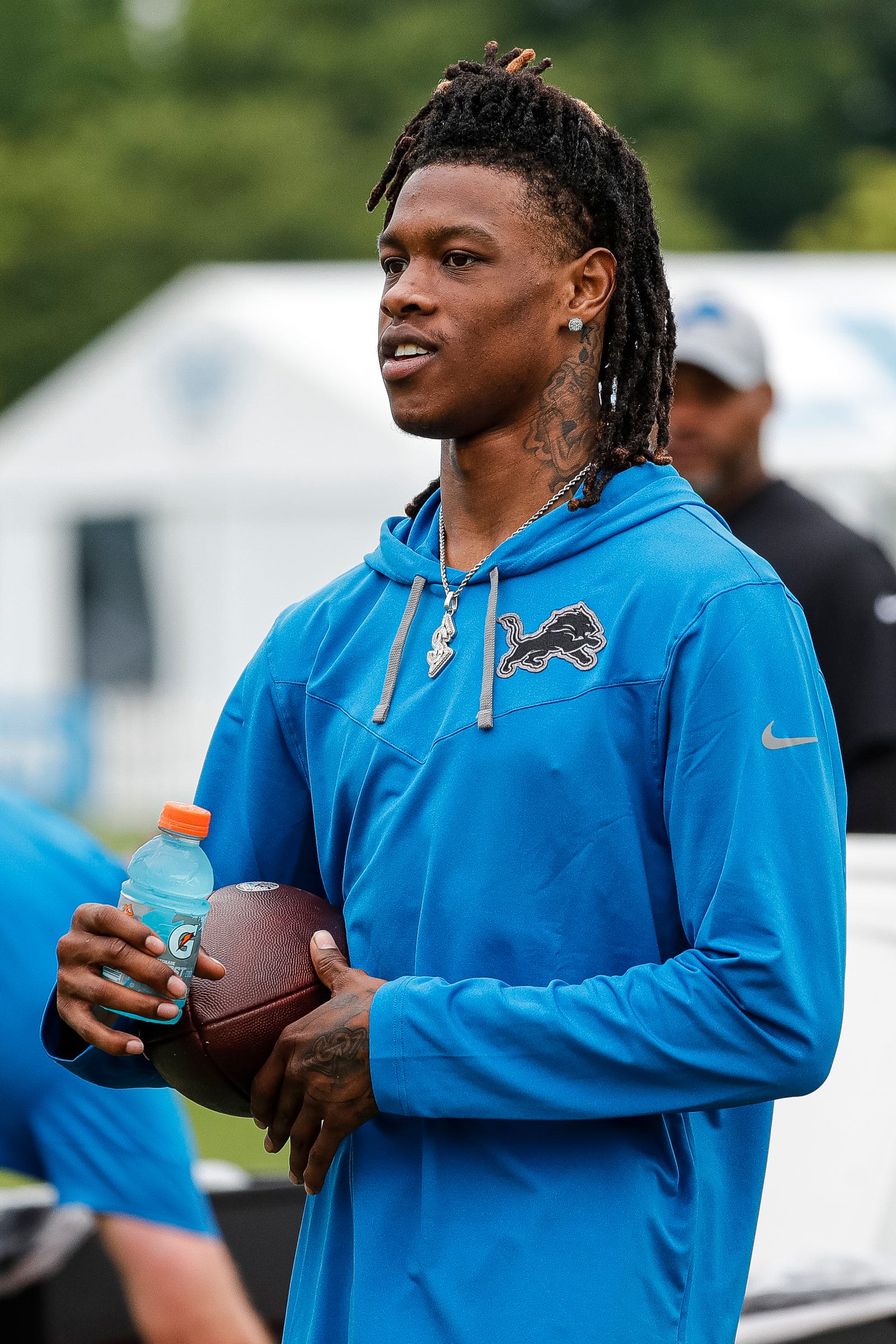
The NFL suspended Jameson Williams on Friday for something legal in 26 states and Canada.
Williams, the Lions’ precocious second-year receiver, was banned six games for placing online bets on non-NFL games from an NFL facility in a probe that also snared three of his Detroit Lions teammates. Stanley Berryhill was suspended six games for the same offense, and the Lions released C.J. Moore and Quintez Cephus, who will serve indefinite suspensions of at least a year for betting on football.
Gambling has been sanitized in this country enough that it’s neither a shock nor an outrage that Williams, a young man with a sizable bank account as the 12th pick of last year’s draft, placed a wager on a sporting event.
NFL DRAFT PREP: 10 NFL draft questions answered before the picks are in
OPINION: Jameson Williams suspension shouldn’t hurt the Lions too much
The natural inclination may be to look sideways at the NFL for its hypocrisy in suspending five players (the Washington Commanders’ Shaka Toney also was caught up in the probe) for an activity it tacitly condones while raking in hundreds of millions of dollars from its partnerships with online betting parlors.
It’s also fair to wonder whether Williams’ lack of judgement 12 months into his NFL career is a concern.
Williams’ agency released a statement Friday that both acknowledged and downplayed his mistake.
“Jameson takes full responsibility for his actions and is very apologetic to the NFL, his teammates and the fans and city of Detroit,” the statement read. “However, it is important to note that Jameson’s violation was not for betting on football but rather due to a technical rule regarding the actual location in which the online bet was placed — and which would otherwise be allowed by the NFL outside of the club’s facility. Jameson would never intentionally jeopardize the integrity of the game he loves so much and looks forward to getting back to his team as soon as possible.”
The NFL explicitly prohibits players from betting on any of its games for understandable reasons, which is why Moore and Cephus received yearlong bans.
The league also forbids players from gambling of any kind in team settings, including at team facilities or stadiums, at team hotels or while travel on team planes.
Those rules are spelled out annually for players in NFL-run education programs, and a sign reminding players of the potential punishment for violating those rules hangs in every locker room in the league.
Maybe Williams had a brain fart, the kind 22-year-olds have every day. Maybe he ignored the rules, thinking he’d never get caught. Maybe he wasn’t clear about the nuances of the NFL’s gambling policy. His punishment feels like a warning to other players across the league.
Whatever the case, there is no excuse for a player being counted on to play a pivotal role on a contending team, and no excuse for a player whose decision making has been called into question in the past.
These are other minor transgressions to be sure, but Williams liked a tweet this spring suggesting the Lions should trade for Baltimore Ravens quarterback Lamar Jackson; pined for a jersey change to Jeff Okudah’s No. 1 on the day Okudah was traded; and last season, during his six-game cameo as he recovered from January knee surgery, liked a tweet suggesting he should get the ball more.
All three posts were met with eye rolls by people in the organization, though Lions quarterback Jared Goff has been nothing but supportive of his teammate publicly.
Williams, who finished his rookie year with more drops (three) than receptions (one), is an extremely talented player with humungous upside who happens to be the first big roll of the dice of Brad Holmes’ tenure as Lions GM. Holmes used some of the extra draft capital he acquired in the Matthew Stafford trade to move up for Williams in last year’s draft knowing Williams was essentially taking a redshirt year.
“I didn’t really care if he played last year,” Holmes said at his pre-draft news conference Thursday. “If he did, he did. I’m glad he did, but I was looking for this year.”
The Lions took precious care of Williams last season, managing his rehab slowly and bringing him with them on road trips to limit his time away from the team and the game.
Williams, a known football junkie who comes from a hard-scrabble past and often broadcasts late-night to fans on Instagram Live, has jeopardized the Lions’ forward-thinking approach with his suspension, which now should impact how they construct their roster.
The Lions will spend the first six weeks of next season without a true No. 2 receiver, when they likely will use Josh Reynolds, Marvin Jones and Kalif Raymond to patchwork the position. They need to add a receiver or three (to replace Cephus and Berryhill, too) through the draft, trade or free agency, and at least one of those players should have future potential.
By the end of this season, Williams will have played in, at most 17 games. That amounts to one full lost season of development in a league quick to leave players behind.
If Williams returns in October and lights the league on fire, all will be forgotten, so long as his absence did not cost the Lions a rare chance to host a playoff game.
Until then, the Lions will keep close tabs on Williams, the crowd he keeps and his actions off the field. They’ll keep their fingers crossed his suspension goes down as a minor bump in the road to greatness he seemed destined for during his one standout season at Alabama in 2021.
Contact Dave Birkett at [email protected]. Follow him on Twitter @davebirkett.